Fish dryer: types, subtleties of choice and a master class on making
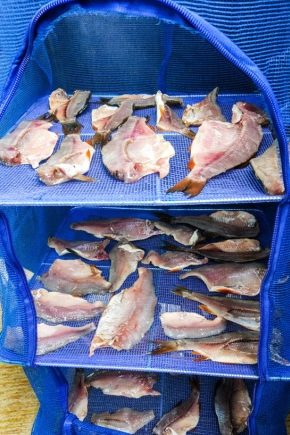
In summer, fishermen in large numbers turn out to be the owners of a solid catch. The key task in this situation is the ability to preserve the trophy for a long time. Drying the catch can be a solution to the difficulty, which will prevent spoilage of the product for the next 8-12 months. But for drying, you need a specialized dryer. It can be either purchased at any specialized store, or made with your own hands. For such purposes, you will need a small amount of different materials and tools.
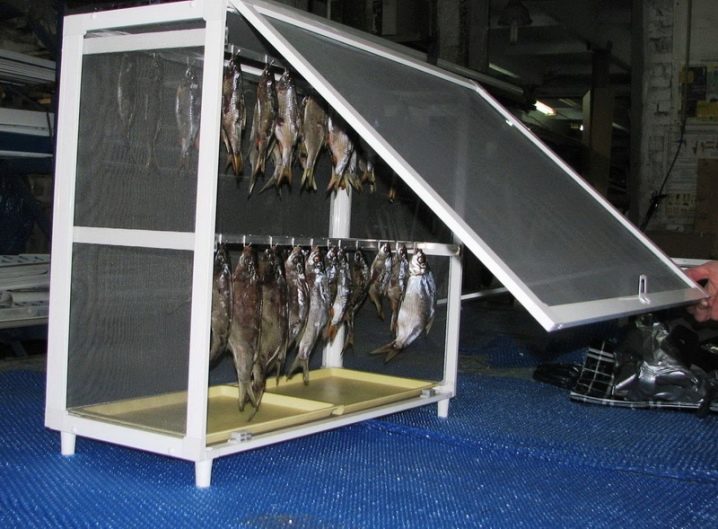
What it is?
This is a specialized fish drying device that can be purchased at specialty stores. Dryers differ in capacity, appearance, options, design, cost. When purchasing an installation, it must be borne in mind that there are a number of modifications of both domestic and foreign manufacturers.
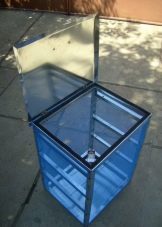
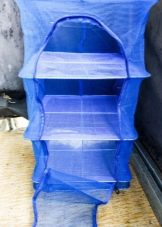
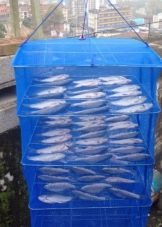
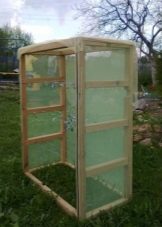
Views
The simplest drying device is considered to be a wire stretched under the awning or an ordinary rope for drying clothes. To protect from flies, a net (or gauze cloth) is simply hung on the fish. Hanging a roach, crucian carp or bream is allowed both on hooks made of wire, from ordinary paper clips, and clamping with clothespins. This method stands out for its simplicity, but it is optimal for a one-time harvesting of fish in a suburban area or during a hike. When the lesson is put on the "conveyor", and good catches are constant, you need to think about a relatively decent design.
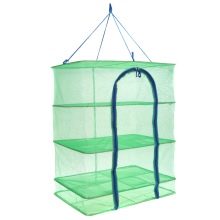
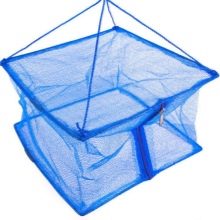
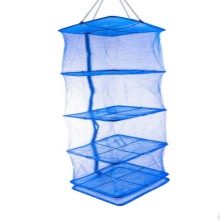
Fish drying equipment can be symbolically divided into two large groups:
- mobile transportable (portable);
- stationary.
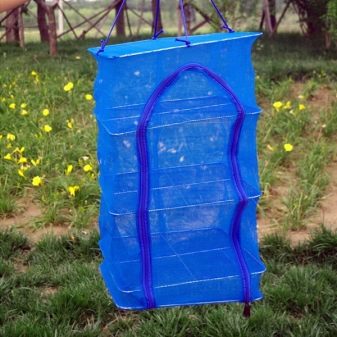
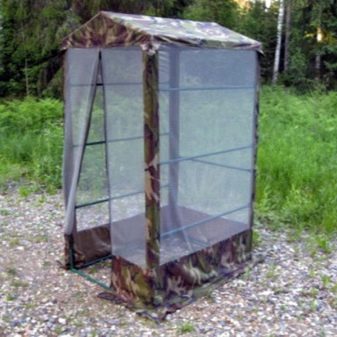
Each of these designs has its own advantages. The first ones can be used anywhere: from the river bank to the loggia in the apartment. Others can be listed for drying cabinets, in most cases they are used not only for fish, but also for drying berries, herbs, vegetables, drying meat and other food purposes. You can simply dry the fish in the open air, or you can organize it with the forced injection of air masses. by means of a fan. At the same time, the withering procedure is much faster, and the product is prepared more proportionally. In the cold season, the drying cabinet can be equipped with electric heaters, which, in turn, will also allow you to quickly cook the fish for consumption.
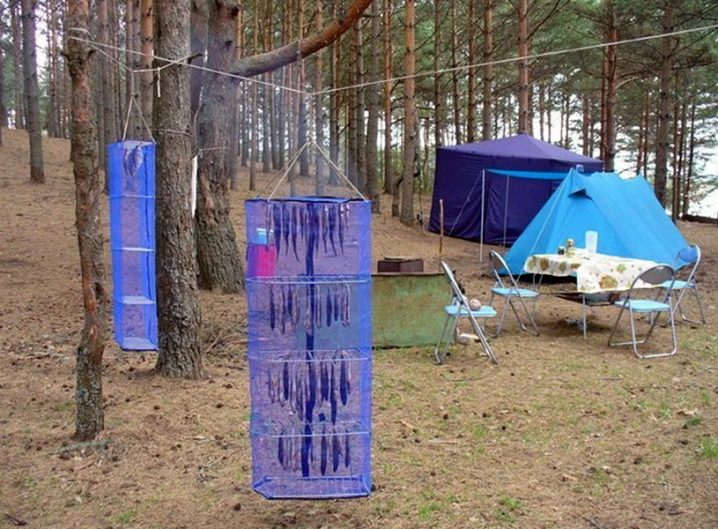
A characteristic feature of the drying chambers is also the number of compartments. As a rule, single-section types are used, but there are dryers with a considerable number of sections, in some modifications their number reaches up to 5 sections. Let's consider some models in more detail.
Factory models
From the factory modifications, 2 options can be distinguished. The first is structurally implemented in the form of a tall cabinet made of steel tubes covered with a mesh. Similar samples are produced by various firms under the Kedr and Mitek trademarks. Another interesting example is the two-level installation IdeaFisher ECO-2. This collapsible design is also small and portable. Moreover, based on the conditions, it functions both suspended and placed on the floor or table.
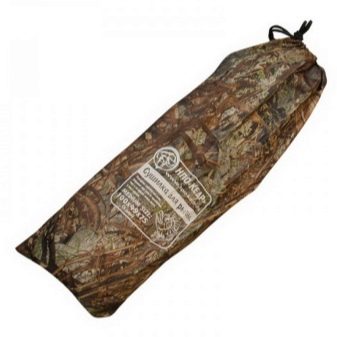
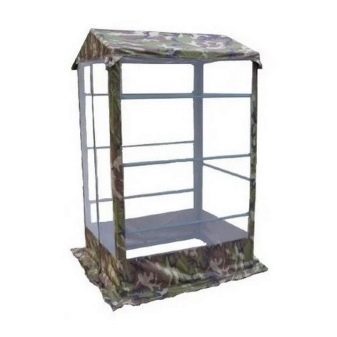
Homemade dryers
From the mass of devices for drying fish, it follows note the following homemade designs:
- frame;
- folding;
- stationary;
- suspended;
- electric dryer;
- with a fan;
- mobile (portable).
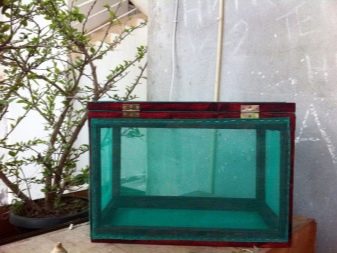
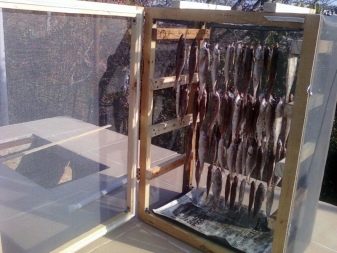
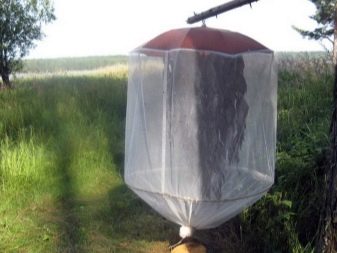
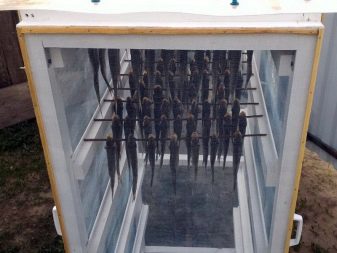
But this is not all that homebrew masters are capable of.
First of all, it is necessary to clarify where exactly the drying will be carried out. If under a canopy, awning or in the attic of an individual house, there are no difficulties with dimensions. If in one of the living rooms, on the loggia or balcony of a multi-storey building, then the parameters of the future equipment for the dryer must be planned, starting from the possibility of placing it in these rooms for drying and further maintenance. In addition, the size and quantity of fish caught in the last fishing trip must be taken into account. Or, balance these conditions for future catches. If the area is very small, it is necessary to analyze the modifications of the folding and hanging dryers.
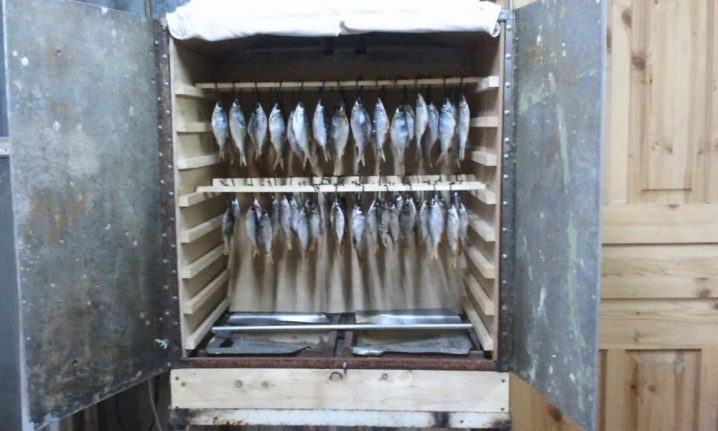
After establishing the required dimensions, you need to decide on the choice of materials of manufacture.
Materials (edit)
It is necessary that steel or wood materials are used for the manufacture of the structure. Thus, it will be possible to practice it for more than one year. The skeleton must be stable. For the fixture to be of high quality, it must be secured with strong components (screws). On top, the base is covered with a thin fabric (chiffon) so that the fish dries in the fresh air. Due to the free movement of air inside the structure, the products will dry much faster.
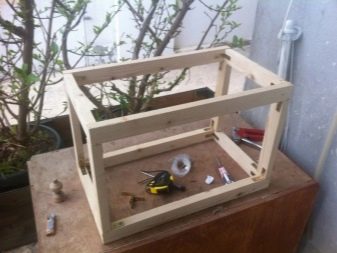
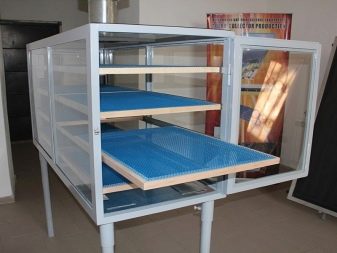
How to choose?
Having investigated all modifications of dryers, the overwhelming majority of anglers trust the time-tested hanging samples, which are realized from a metal frame and a nylon mesh cloth. The key advantages of such a material are structural strength during drying, protection of fish from unnecessary contact with flies, experience accumulated over decades. The structure contains many levels, thus guaranteeing the entry of clean air for the production of high-quality and non-hazardous food products. To dry the fish after fishing, you can use hanging samples from various companies.
- "Three whales". This is a well-known domestic manufacturer that carries out the mass production and sale of everything needed for hunting and fishing.
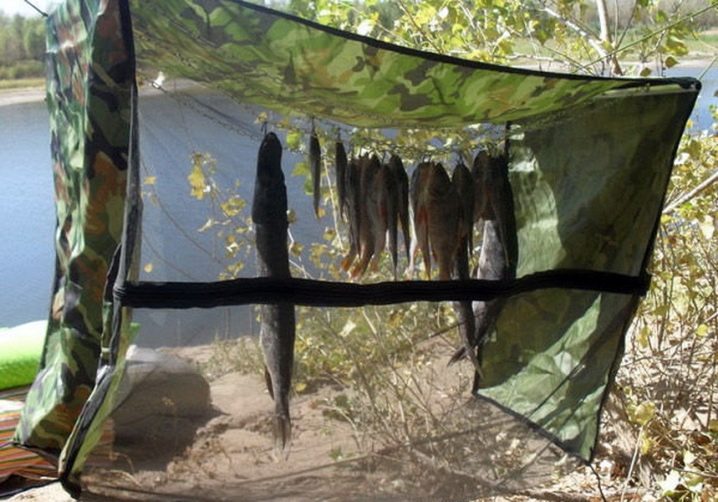
- Sport-Fish. This is a foreign product, which is no less in demand among beginners and professional fishermen. There is a multifunctional sample, which, in addition to drying fish, can be used to dry vegetables, fruits, mushrooms.
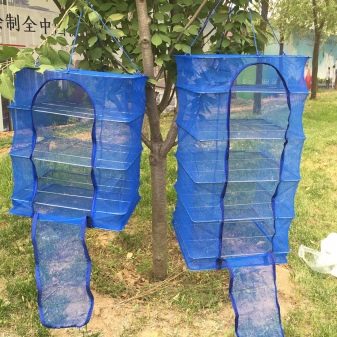
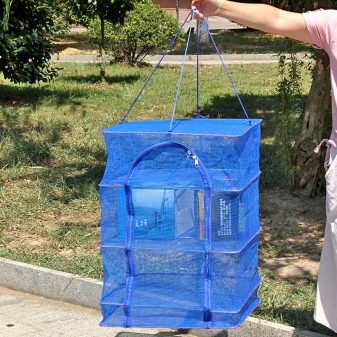
- "Cedar". In order to make life easier for fishermen, the Kedr company has additionally created a hiking version of the net for drying fish. Its structure is strong and durable, it makes it possible to dry fish on a long trip or at a summer cottage.
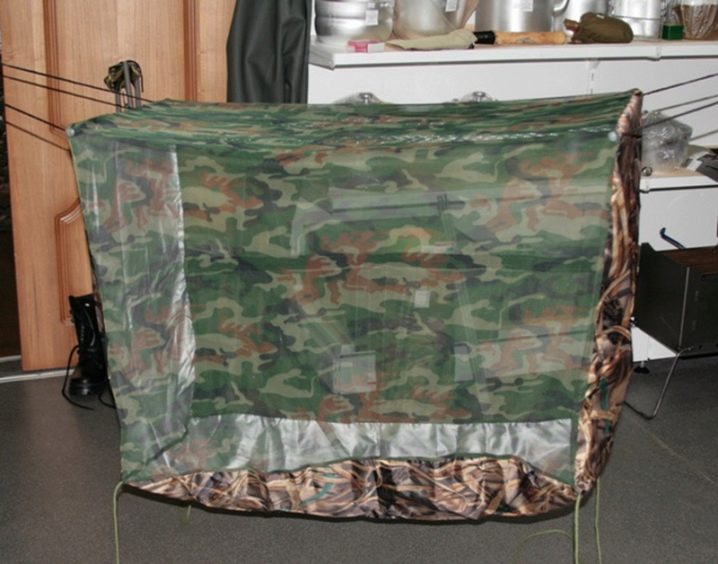
- Electric fish dryer. All of the above modifications are manually controlled, in other words, the required effect depends solely on the human factor. In fact, such a device can be recreated at home, using several gauze shells, wood (steel) crossbars. The fish needs not only to be caught, but also to be hung, along with this, to exercise constant control - a natural process of its drying. In order to speed up obtaining the final result, it is desirable to use the most advanced modifications - electric dryers. These innovative installations are much more expensive, but in the shortest possible time they allow you to enjoy the memorable taste of dried fish.
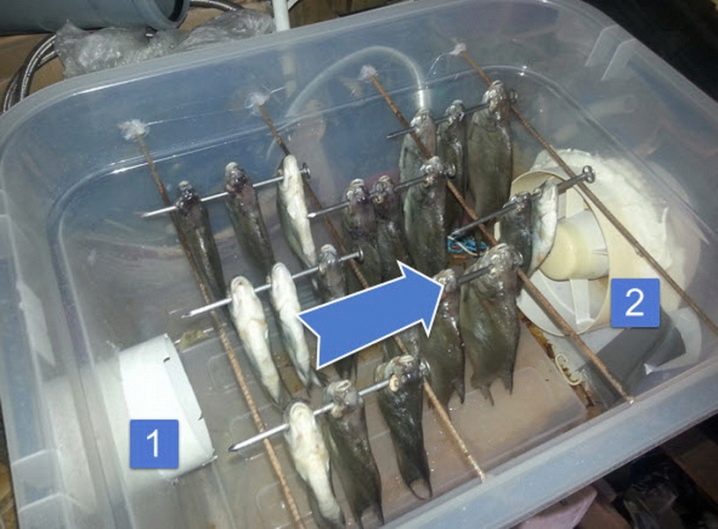
How to do it?
So we got to the fun part. Let's talk about how the fish dryer will be built with our own hands. It should be noted right away that there are a huge number of dehydrator devices.It is very difficult to tell about all the varieties of self-made structures within the framework of one article, since the imagination of the domestic Kulibins is really inexhaustible. Information! Dehydrator literally translated from Latin means "dehydrator", in other words, the same as a dryer.
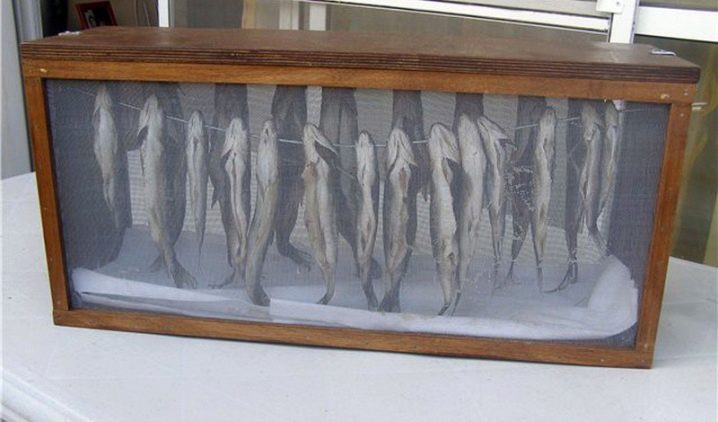
Wireframe Models
In most cases, homemade gadgets are made in the form of a wooden box covered with a mosquito net. And one of the most common is considered a variation with dimensions of 500x500x500 millimeters. At the initial stage of manufacturing, it is necessary to prepare the required number of wooden blocks, process them with sandpaper and cover with a preservative solution. The coating is obliged to protect the device from moisture and salt, but at the same time not to emit negative fumes that the drying product can absorb.
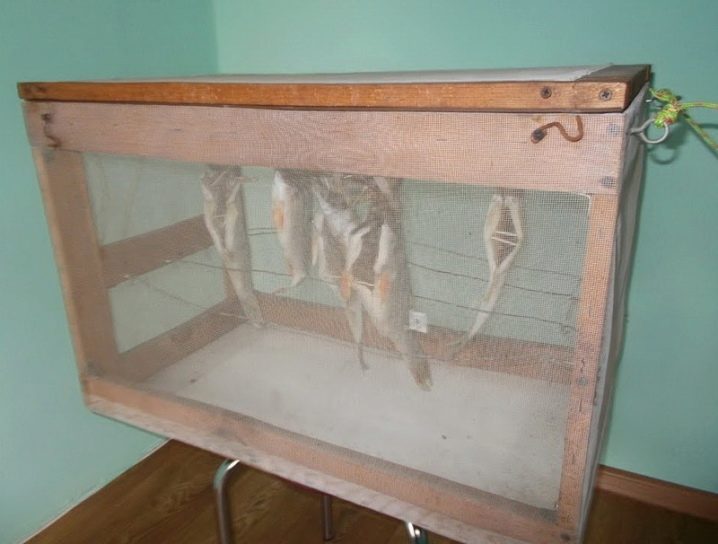
After that, according to a preliminary drawing, the skeleton of the future dryer is assembled. Self-tapping screws and iron corners are used for mounting. To create such a box, you need to follow a series of steps.
- Mark the timber, then cut it with a jigsaw or a hand saw.
- After that, using a screwdriver, corners and screws, mount the frame.
- Stiffening partitions are placed on all sides.
- A cable is fixed on the side walls (in fact, the fish is dried on it).
- Next, it is required to process the box with an insect repellent.
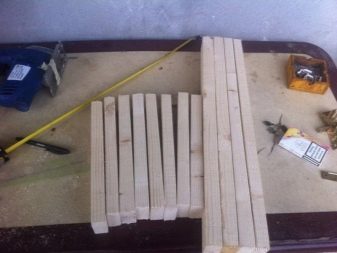
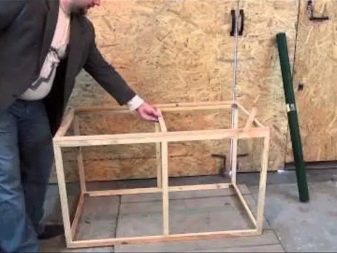
- It must soak the material and dry, and only then the box can be varnished. It is absolutely necessary to apply it in 2 layers with a time interval of 4 hours.
- It is necessary to install specialized spacing on the bottom of the box.
- The door frame must be sealed. Having done this work, you will have a ready-made box for drying fish, where no insects will be able to get through.
- Recommendation! The static dryer can be installed directly on the wall.
- After the base is ready, they take up the tension of the mesh. Along with this, it is necessary to clarify how the access inside will be made. To do this, make a door or stitch in a zipper.
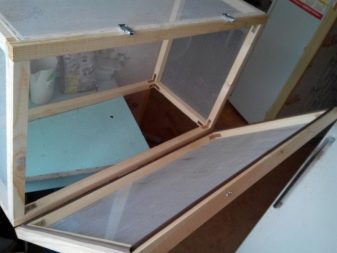
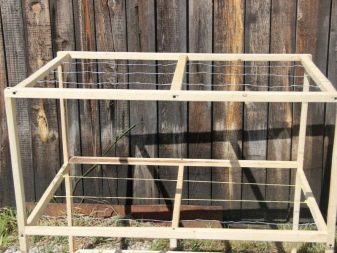
Another option for a similar homemade product is to use not a tension mesh as a drapery, but devices from modern PVC windows. In this version, it is not required to make a separate door, but to use a frame from a ready-made mosquito net.
Fan dryer
Some of the models of dryers made by Russian craftsmen have fans in their own structure. Air heat exchange in such dehydrators makes it possible to accelerate the drying process. Such devices are created from a variety of plastic containers or something like closed cabinets through which an air stream is driven. Let's analyze the production process of a simple device with a fan. For this purpose we need:
- large plastic tank - from 20 liters and more;
- ventilated exhaust fan;
- ventilation grill;
- steel rods with threads and appropriate nuts;
- fasteners for the grille and fan.
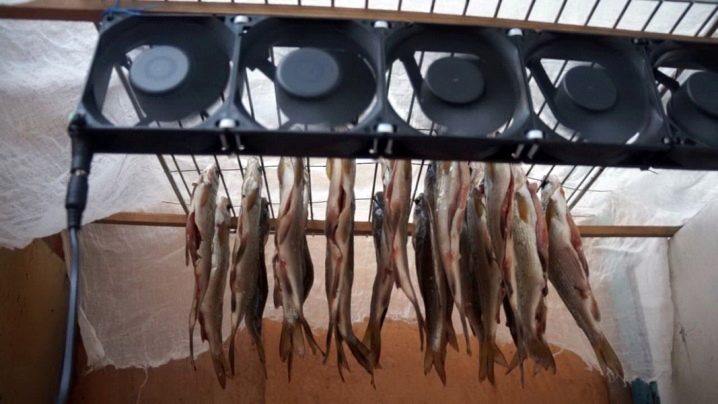
We work in the following order:
- in the lid of the tank we make a hole for the ventilation grill and fix it;
- we attach the fan in the same way in any of the side ends of the plastic box;
- in the upper segment of the tank we create holes for the rods and insert them, fixing them with nuts (we will hang fish and meat in this place).
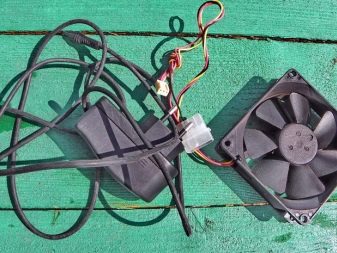
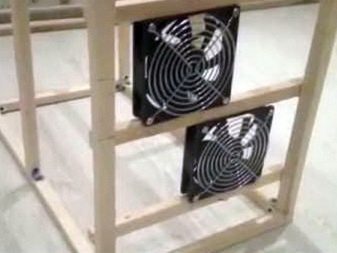
If you want to increase the ambient temperature in such a dryer, you can use electric rugs. Such products are sold in pet stores for breeding reptiles.
Successful examples
We present to your attention several rather interesting options created by domestic craftsmen. The most ingenuous and reliable method to protect the fish from insects is to make a box out of slats and cover it with gauze or iron mesh.The gauze, of course, can be exchanged for an ordinary mosquito net. The dimensions of the box directly depend on the amount of fish and on its size, of course. If you are going to dry sabrefish, rudd, roach or something similar, then the box should be created not cumbersome. By and large, it is advisable to create a box only once and for any type of fish. In other words, multifunctional. Cover it with a net and that's it, forget about insects forever. For practicality, make one side with a lid in order to remove the finished dried fish from the box.
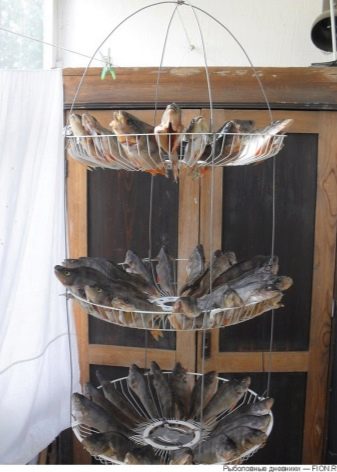
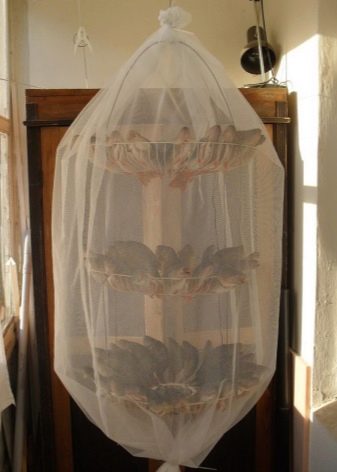
An unconventional method of replacing the box: an ordinary umbrella was covered with a net - and dry it to your health. And from the scorching sun, and from the rain, and from insects there is protection: three in one, so to speak.
Device for drying fish on a loggia or balcony
Suspension devices differ from stationary ones in that, according to their name, they are suspended from the wall, as a result of which their height and location can be adjusted, which is practical when looking for a more good place by the amount of wind or sun. You can dry anything in such a device: fish, meat, mushrooms, berries, and so on.
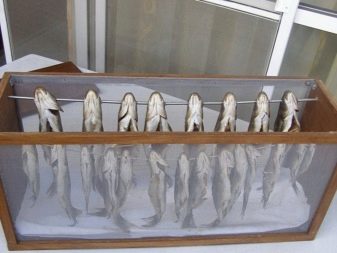
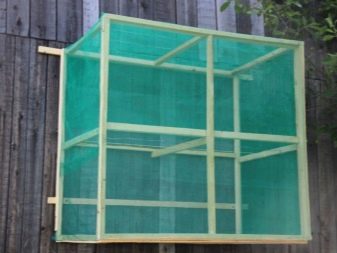
Dryer for fish (dismountable)
Materials:
- grilles from floor fans - 3 pieces;
- wire;
- fan (cooler) computer - 2 pieces;
- computer power supply - one piece.
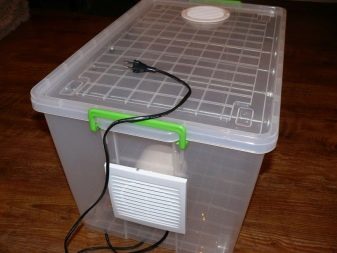
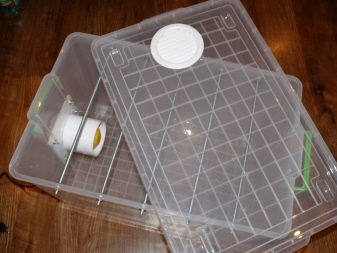
All used materials. Coolers blow towards each other, creating not very great turbulence.
For information on how to make a turbo fish dryer, see the next video.




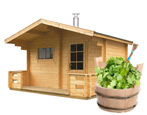
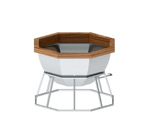
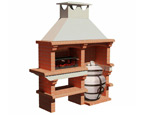

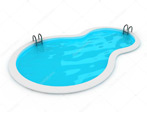
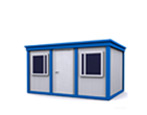


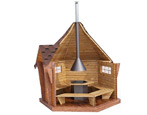

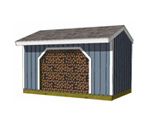
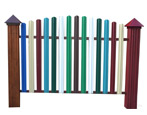
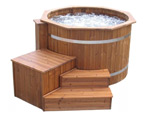
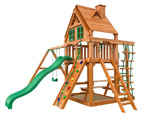
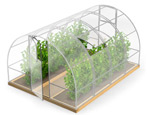
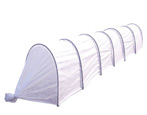
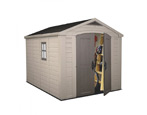








































The comment was sent successfully.